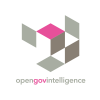-
1 comment
OpenGovIntelligence objective is to stimulate sustainable economic growth in Europe modernizing Public Administration by the co-creation of Linked Open Statistical Data (LOSD) tools by citizens, businesses and public authorities. In order to reach this main objective they will identify the challenges of opening up and exploiting LOSD, specify a framework based in user-centered design and the collaboration of businesses and public authorities to facilitate the co-production process and the development of different ICT toolkits, toolkits that will be developed in six pilot studies. The ICT tools will be built using existing linked data tools developed by the partners of the consortium or other open source available solutions.
Work is going as scheduled and if it goes as it is planned this study will: i) analyze LOSD exploitation barriers; ii) create a framework indicating all the specifications needed for public co-creation; iii) ICT tools to create, expand and exploit LOSD; iv) methodology to obtain and evaluate the system and project success in Pilot studies; v) train stakeholders in the use of the services developed in the project. All these objectives together have a main aim, foster the use of Open Data and develop ICT tools that will allow the use of Open Data by specialized and non-specialized people, fomenting their usage, and thus, contribute to the expected impacts of the call.
There is very useful information in D1.1. Table 3 for Evaluating the Open Linked Data Maturity Level of Pilots is very interesting, since it helps in set the starting point and the roadmap in the different pilot studies. This table could be a very useful guide for the development of future pilot studies. Stages of Open Government Data Lifecycle can be seen in Table 7.
Context related factors have been identified by literature review and surveys in D2.1. and have been grouped in: technology-related factors, stakeholder related factors, legal and policy context and organizational factors.
D4.1.has a very good list of methods to collect Data, and evaluate it in the different stages of development (co.initiation, co-design, co-implementation and co-evaluation), for the different stakeholders and in different dimensions (co-creation framework, ICT toolkit, acceptance and outcomes evaluation).
Risks have been properly identified for each pilot experiences.
In order to improve the quality of the work, some issues should be improved in the deliverables:
1. Through the summary and the different public deliverables there is a wide use of acronyms from the informatics and technological fields. Most of these acronyms are not defined in the text (e.g. in D1.1. URI, W3C, KPIs, API). Definition of the acronyms gives quality to the text and improves the understanding of the text by non-specialized professionals and citizens, which are one of the project stakeholders.
2. D1.1. Cases of study are defined in D1.1. However, pilot number 2 (Enterprise Lithuania) has a low quantity of information about the LOD that are going to use, what are they going to do with it and how they will share the developments. Moreover, the solution that are going to develop “The final product/service will let the users to navigate the Vilnius city map and see all active businesses from up to 5 most popular business areas in the city”, the way it is defined, is similar to some current tools in the market e.g. OpenStreetMap. Pilot 5 should be more defined and closed data availability is not clear. In Pilot 6, dataset access is right now as closed data, although they say that access to data can be easily requested, one of the objectives should be to solve this dataset access problem towards an open model, in order to allow an easier access and higher access and usage of OpenData.
3. How it will be assured the participation of stakeholders during the execution phases on each trial site should be defined.
4. KPIs to quantify the impact on public authorities have not been defined.
5. An approximation of KPIs objective to reach during and after the development of the project should be included.
The most significant results of the OpenGovIntelligence (OGI) are the development of public datasets of each of the pilot experiences and of OGI ICT tools for the creation, expansion and exploitation of LOSD. Provenance of dataset information can be from different vocabularies (SKOS, DCAT, etc.) and exploitation of the information will be done in the RDF data cube vocabulary. Datasets will be mainly used by specialized professionals. With the appropriate training (as has been planned in the proposal of the project) ICT tools can be used by specialized and by non-specialized people. Citizens training in the developed ICT tools is planned to be done in workshops. This action is mainly directed towards a small number of people. Webinars are also mentioned but they are not defined yet, and this type of action, although it allows reaching more people, it is also directed towards a small amount of people and for a limited period of time. A wider audience and better dissemination of tools usage could be done through video tutorials available online at any time (e.g. in YouTube).
In general, dissemination measures are very well described with dissemination materials and channels to be used, and different quantification methods and project´s targets have been defined (e.g. Google analytics, number of followers in social media, number of reports, etc.) in Deliverable 5.2. Dissemination objectives and the actions required to obtain them are detailed. However, dissemination actions per type of stakeholder (public authority, citizen or business) should be indicated. Already developed dissemination activities have been focused on experts. However, their involvement through dissemination actions is not detailed.
Project website is poor. Page structure and access to the different information is not clear. Project Deliverables should appear in the webpage, together with more information about the project, links to project social media and access to datasets and OGI toolkits in a structured and clear.
The development of the different pilot toolkits in the way it has been planned allows their usage using datasets of other countries, and by specialized and non-specialized people, what will foster Open Data usage.
The different tasks planned to accomplish the objectives of the project are appropriate. However, some recommendations are:
1. Web repositories (github.com) should be better structured/ organized in different themes or modules. A more user friendly structure will improve the access and will increase the Dataset usage from the different stakeholders.
2. A proper exploitation plan should be written.
3. Most of the datasets are currently in Google drive. Public visibility is not good and should be improved during the development of the project.
4. Collaboration with other EU projects working on the same area of interest could help structuring a thematic community, what could help in the development of policies for the usage of Open Data.


